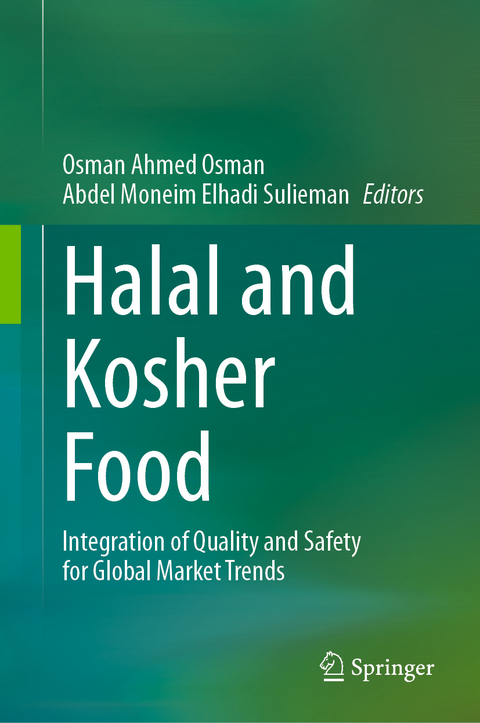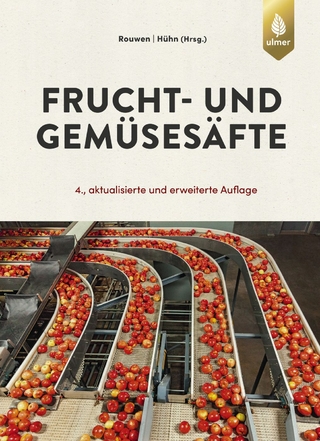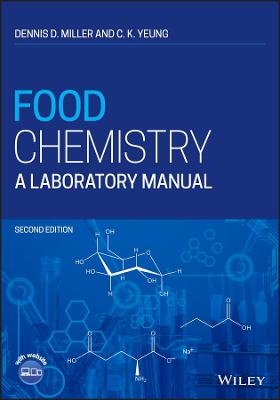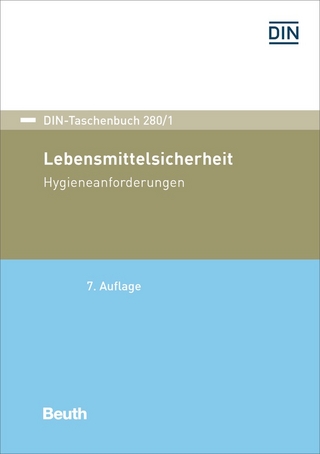
Halal and Kosher Food
Springer International Publishing (Verlag)
978-3-031-41458-9 (ISBN)
In both Islamic and non-Islamic countries many population groups worldwide, such as vegetarians and people of the Jewish faith, consumers do not eat pork. Amongst these groups consumers are concerned about importing processed food which may contain or has been contaminated with pork or swine-derived products. This is especially true of halal foods in Muslim communities where the foods may be prepared or processed utilizing one of more non-halal ingredients. Halal and kosher foodstuff play an incredibly important role in the Muslim and Jewish diet, economy and health. This makes halal and kosher food product quality, safety and shelf life preservation a major topic in these communities and for the manufacturers of halal and kosher food products.
Halal and Kosher Food: Integration of Quality and Safety for Global Market Trends covers a wide range of important topics in halal foods including quality, standards, safety of food additives, antimicrobial andveterinary drug residues, aflatoxin in feedstuff, application of Hazards Analysis and critical Control Points (HACCP). Important data regarding halal and kosher food similarities and differences are covered in full. Best practices in halal food product manufacturing are covered, plus the importance of halal food safety for consumer health. Written by elite international halal food experts, this work differs from other books on the subject which focus on history, legislation and certification. Readers can utilize this book as an orientation and practical guidebook to recognize the quality and safety of halal food products.
lt;p>Dr. Osman Ahmed Osman works for the Department of Standards, Qatar General Organization for Standardization in Doha, Qatar and the Department of Research of the Sudanese Standards and Metrology Organization in Khartoum, Sudan.
Prof. Dr. Abdel Moneim Elhadi Sulieman is a Professor in the Department of Biology, College of Science at the University of Hail in the Kingdom of Saudi Arabia and the Department of Food Engineering and Technology, Faculty of Engineering and Technology at Wad-Medani, Sudan.
The importance of halal food and its legality in both Islamic and non-Islamic communities around the world.- Dilemma and Concepts of Halal-Safe Food.- Metrology's Importance and Application in the Halal Food Assurance System.- Concept and Significance of the Halal Traceability System.- Kosher and halal food dissimilarities and challenges in accessing international markets.- One Health- new approach towards halal food safety.- Laboratory Methods for authenticating conformity of Halal Foods.- Models for risk analysis applicable to Halal food products.- Halal and kosher slaughter procedures in livestock and poultry.- The origins, usage, and production methods of halal and kosher gelatin.- Fraud on Halal food: principles, quality challenges, and safety concerns.- Standards and their application to the production, manufacture, and storage of halal food.- Fermentation techniques used to enhance the quality of halal food products.- Principles and techniques of sensory evaluation for assessing the quality of halal foods.- Good practices: Conception and implementation through the Halal food supply chain.- Contamination of Halal Beef Carcasses by Bacteria Grow or Survive During Cold Storage.- Inherent and extrinsic factors related to the shelf life of halal food stuff.- Impact of fluctuating storage temperatures on the sensory and microbiological quality of halal beef products.- Food additives and their applications in the production of halal and kosher foods.- The origin of enzymes and their applications in the production of specific halal products.- Pesticides Maximum Residues Levels (MRLs) in Halal Food.- The prevalence of microorganisms and their impact on the wholesomeness of particular Nile fish and fish products.- Significant risk of Shiga toxin-producing E. coli in certain halal foods.- Antimicrobial resistance: Challenges and Incidence in Various Halal Food Products.- Manufacturing Procedures for Controlling Harmful Microorganisms in Halal Chicken Meat Products.- Effects of heavy metal contamination on the safety of halal foodstuffs.- The incidence of aflatoxin in feedstuff and foodstuff and its significances on the wholsomnness of halal food.- Non-alcoholic drink safety and halal certification.- Production of Halal Meat Using HACCP System: Idea and Implementation.
| Erscheinungsdatum | 14.10.2023 |
|---|---|
| Zusatzinfo | XXI, 411 p. 49 illus., 42 illus. in color. |
| Verlagsort | Cham |
| Sprache | englisch |
| Maße | 155 x 235 mm |
| Gewicht | 771 g |
| Themenwelt | Technik ► Lebensmitteltechnologie |
| Schlagworte | Halal Food • Halal Food Fraud • Halal Food Safety • Halal Food Standards • kosher foods |
| ISBN-10 | 3-031-41458-6 / 3031414586 |
| ISBN-13 | 978-3-031-41458-9 / 9783031414589 |
| Zustand | Neuware |
| Informationen gemäß Produktsicherheitsverordnung (GPSR) | |
| Haben Sie eine Frage zum Produkt? |
aus dem Bereich


